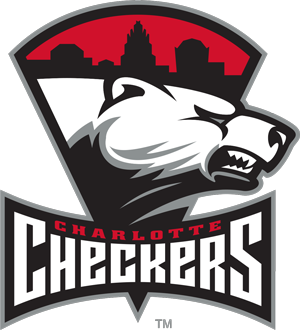This time last year, Patrick Dwyer was racking up points in the United Kingdom as a key part of the eventual Elite Ice Hockey League champion Belfast Giants. This year, things are a little different.
Dwyer, Charlotte’s 36-year-old assistant coach, is now 30 games into his new career and getting the hang of how things work behind the bench.
“It’s been a lot of learning early on, seeing what goes on,” said Dwyer. “As a player you don’t really see some of that stuff that you do from a coaching standpoint.”
Along with the general adjustments to coaching, Dwyer has had an added challenge. With Ryan Warsofsky being promoted to head coach, Dwyer was handing the task of manning Charlotte’s defensive corps after spending his 14-year playing career at forward.
“Early on it was a bit more of an adjustment,” he said. “There are some of the small details that you think you know as a forward but you don’t. But I’ve been working with Warsy and [Tim] Gleason and they’ve been great at getting me up to speed on all that.”
A big part of Dwyer learning the ropes has been the presence of Gleason, who heads Carolina’s Defensemen Development and spends a large amount of time in Charlotte alongside his forward counterpart in Sergei Samsonov. That trio all played together during their NHL careers.
“We mesh really well,” he said. “There’s guys here who have been together for several years, it’s not the first time we’ve met.”
Joining a tight-knit group has proven to be beneficial for Dwyer, especially when it comes to doing one-on-one video sessions with players – something he often does alongside Gleason.
“It’s good to be able to go to a guy and show that it’s not just one of us seeing it,” said Dwyer. “It’s the whole group on the same page trying to get these kids to where they’re going.”
Dwyer’s lengthy playing career not only coincided with some of his coaching partners, it even overlapped with current players like team captain Roland McKeown.
“He has a really good feel for the game behind the bench,” said McKeown, who was teammates with Dwyer in Charlotte as a rookie in 2016-17. “He’s a good game manager, he can sense who’s going and that kind of stuff. He was always a really smart hockey player when I played with him so I’m not surprised that he has a really good mind for the game as a coach.”
Even the younger skaters seem impressed by how Dwyer can relate to them.
“He’s very intelligent,” said Jake Bean. “I feel like every time I see something he sees it too and know what I’m talking about. I think that goes for a lot of the team. When he’s on the same wavelength as us, that helps.”
Having played pro hockey as recently as last season, Dwyer brings a unique experience that can’t be found very often around the league.
“It brings another aspect when you’ve played and played so recently,” said Bean.
“He had a really good career so he knows what we need to look for,” said McKeown. “He can relate to us really easily.”
Dwyer’s perspective as a recently retired player has come in handy in the locker room as well, with just as much of his job coming down to handling individuals.
“There’s 25 different personalities in that room and you have to learn what makes each guy tick and what’s going to help a guy respond,” said Dwyer. “That’s another adjustment because as a player you don’t really see that stuff. You just maybe go up to your teammate and say ‘Hey let’s get going.” As a coach some guys don’t respond to yelling, some guys do, some guys respond to video, some guys respond to seeing it on the ice. You just have to find those personalities and what’s clicking. As a player you do see that stuff, but on the coaching side it’s a little bit different.”
A key part of Dwyer’s growing as a coach is the relationship he’s built with Warsofsky.
“We’ve got a good working relationship,” said Dwyer. “If there’s been any questions he’s been good to help me with that. And at the same time he gives me my space to learn on my own and work my way through it. It’s been a good relationship.”
The youngest head coach in the AHL, Warsofsky is using his personal path to help Dwyer start his career.
“It’s like when I was a first-year coach, [then South Carolina coach] Spencer Carbery was a huge influence on me,” said Warsofsky. “Especially in running certain systems and teaching me. So [Dwyer] is bouncing things off me.”
Warsofsky has helmed a dominant penalty kill for years, but now he’s handed that unit over to Dwyer, entrusting him with what has been a point of pride.
“He’s been really good,” said Warsofsky. “I’ve had success with the system before so we didn’t really want to change it. He was really open to doing what we wanted and he’s learned and done a really good job of teaching it, which is important. He’s put his own little twist on things and he’s been excellent at prescouting it and showing video and teaching it and pointing out what their trigger points are and what we’re looking for in certain situations.”
That even includes Dwyer introducing his own touches to the system.
“He has given me free reign to make some tweaks here and there,” said Dwyer. “We adjust according to what we’re going to see or what we think we’re going to see that weekend. If there is anything major where I’m thinking ‘Hey let’s try this,’ I’ll bounce those things off Warsy. At the end of the day he’s the head coach so it all comes back to him. That’s part of the relationship we have that we can bounce things off of each other.”
In the short time they’ve been together, Warsofsky and Dwyer have quickly meshed into a compelling duo.
“They’re similar in some ways and different in some ways,” said Bean. “I think they bring the best out of each other. They complement each other and that makes it easier for us.”
The transition from playing to coaching has been quick for Dwyer, but the early results point to what could be a long career behind the bench.
“It’s a lot different than playing, it’s a lot different than watching up in the stands,” said Warsofsky. “The biggest thing is being able to teach it and Patty’s done a really good job of that.”





